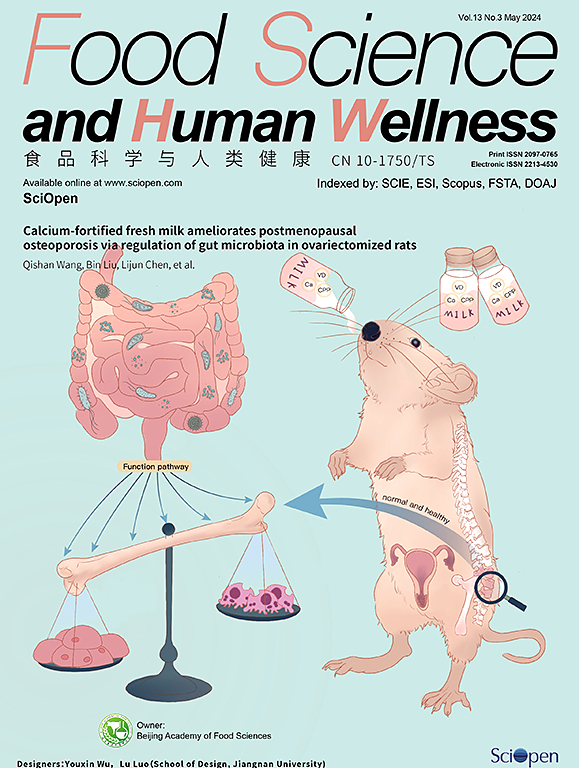Protective effects of Bifidobacterium breve on imiquimod-induced psoriasis in mice through secondary bile acid production and FXR-TLR4/NF-κB pathway
IF 7.4
1区 农林科学
Q1 FOOD SCIENCE & TECHNOLOGY
引用次数: 0
Abstract
This study aimed to evaluate the effects of Bifidobacterium breve CCFM683 on psoriasis and to investigate the underlying mechanisms. B. breve CCFM683 significantly ameliorated psoriasis in mice as well as elevated the deoxycholic acid (DCA) and lithocholic acid (LCA) in the colon compared with those of the imiquimod (IMQ)-treated mice. Meanwhile, B. breve CCFM683 increased the relative abundance of DCA-producing Lachnoclostridium and diminished the harmful Desulfovibrio and Prevotellaceae UCG001. Additionally, the farnesoid X receptor (FXR) in the skin was activated and the expression of the Toll-like receptor 4 (TLR4)/nuclear factor kappa-B (NF-κB) pathway was inhibited, and the downstream interleukin (IL)-17 and tumor necrosis factor (TNF)-α were downregulated whereas IL-10 was up-regulated. Moreover, the subsequent hyperproliferation of keratinocytes and the dysfunction of the epidermal barrier were improved. In conclusion, CCFM683 administration ameliorated IMQ-induced psoriasis via modulating gut microbiota, promoting the DCA production, regulating the FXR-TLR4/NF-κB pathway, diminishing proinflammatory cytokines, and regulating keratinocytes and epidermal barrier. These findings may be conducive to elucidating the mechanism for probiotics to ameliorate psoriasis and to promote its clinical trials in skin disease.

双歧杆菌通过次级胆汁酸生成和 FXR-TLR4/NF-κB 通路对 IMQ 诱导的小鼠银屑病的保护作用
本研究旨在评价短双歧杆菌CCFM683对银屑病的治疗作用,并探讨其作用机制。与咪喹莫特(IMQ)处理的小鼠相比,短芽孢杆菌CCFM683显著改善小鼠牛皮癣,并提高结肠中去氧胆酸(DCA)和石胆酸(LCA)。同时,B. breve CCFM683增加了产dca的Lachnoclostridium的相对丰度,减少了有害的Desulfovibrio和Prevotellaceae UCG001。激活皮肤法尼松X受体(FXR),抑制toll样受体4 (TLR4)/核因子κ b (NF-κB)通路表达,下调下游白细胞介素(IL)-17和肿瘤坏死因子(TNF)-α,上调IL-10。此外,随后的角化细胞过度增殖和表皮屏障功能障碍得到改善。综上所述,CCFM683通过调节肠道菌群、促进DCA生成、调节FXR-TLR4/NF-κB通路、减少促炎细胞因子、调节角化细胞和表皮屏障来改善imq诱导的银屑病。这些发现可能有助于阐明益生菌改善银屑病的机制,并促进其在皮肤病中的临床试验。
本文章由计算机程序翻译,如有差异,请以英文原文为准。
求助全文
约1分钟内获得全文
求助全文
来源期刊

Food Science and Human Wellness
Agricultural and Biological Sciences-Food Science
CiteScore
8.30
自引率
5.70%
发文量
80
审稿时长
28 days
期刊介绍:
Food Science and Human Wellness is an international peer-reviewed journal that provides a forum for the dissemination of the latest scientific results in food science, nutriology, immunology and cross-field research. Articles must present information that is novel, has high impact and interest, and is of high scientific quality. By their effort, it has been developed to promote the public awareness on diet, advocate healthy diet, reduce the harm caused by unreasonable dietary habit, and directs healthy food development for food industrial producers.
 求助内容:
求助内容: 应助结果提醒方式:
应助结果提醒方式:


